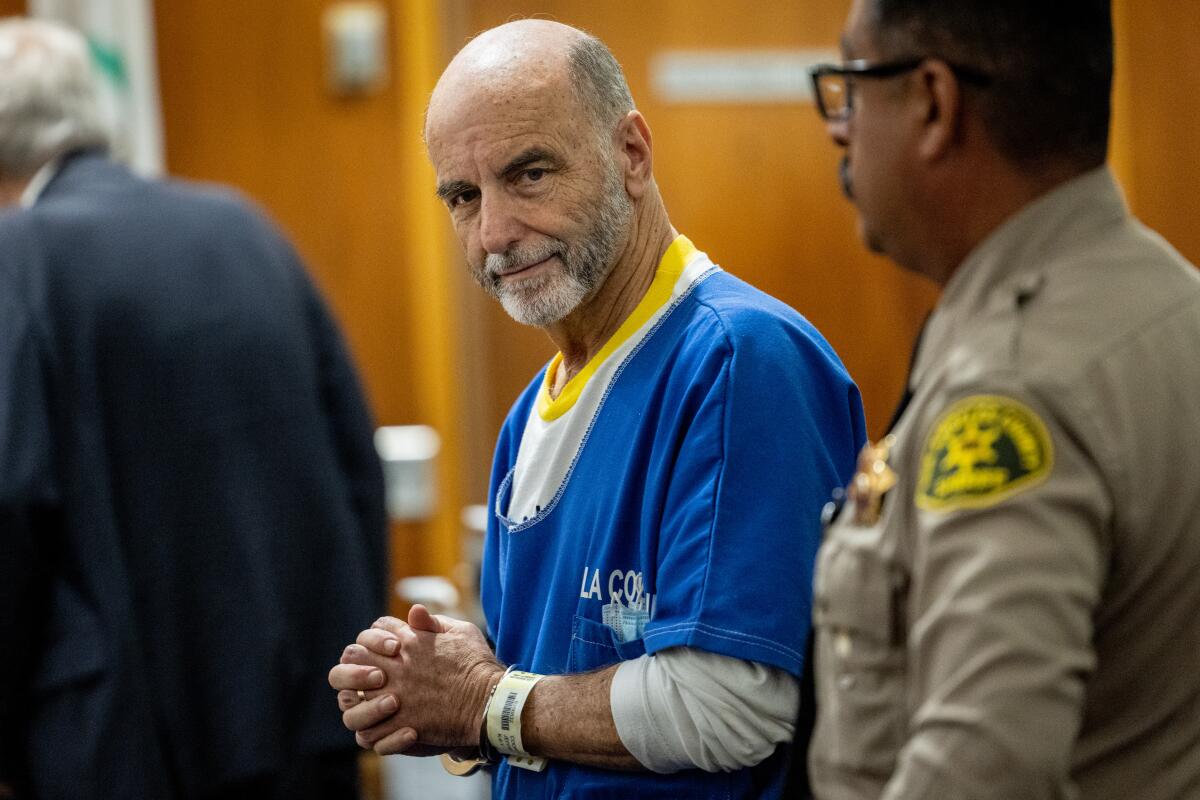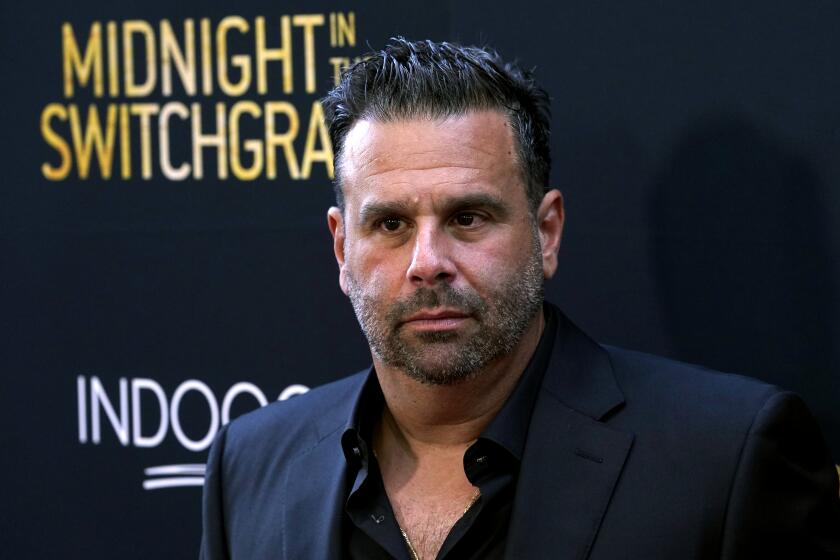Academy member sentenced to 8 years in state prison for child molestation as accusers file lawsuit

- Share via
Jeffrey Cooper, a renowned architect and acoustic engineer whose work and innovations have spanned numerous Hollywood films and institutions, was sentenced to eight years in state prison on three counts of child molestation on Monday.
Cooper, a longtime member of the Academy of Motion Picture Arts and Sciences, faced a maximum sentence of 12 years in prison. He will also be required to register as a sex offender.
Before sentencing in Los Angeles Superior Court in Van Nuys, David Ring, an attorney representing Cooper’s two accusers and their families, filed a civil suit against the architect for “personal injuries and damages arising out of childhood sexual abuse” in Los Angeles Superior Court.
The civil suit also names Calabasas Shul, the synagogue that Cooper founded in 1994 in Calabasas and where he served as its board president. According to the suit, the synagogue operated out of a residential property that Cooper owned, paying him rent, and also held “religious events and gatherings at Cooper’s house and other locations.”
The suit alleges that Cooper “took advantage of his position of authority and trust as the president of the board of directors and founder of the Shul to engage in unlawful sexual abuse and other harmful misconduct with Plaintiffs.”
“The two victims and their families are relieved the criminal process is finally over, after four long and brutal years. They can now pursue a civil case against Cooper and the Shul with the goal of holding all those responsible fully accountable in the civil courts,” Ring said.
Following a two-week criminal trial in May, a jury convicted Cooper on three felony charges of a lewd act on a child involving one of his accusers.
Jurors, however, were unable to render a verdict on five counts against Cooper involving a second accuser. Judge Alan Schneider declared a mistrial on those charges.
The trial took place four years after Cooper was arrested and a grand jury indicted him on eight counts involving two minor children. Cooper, a resident of Calabasas, pleaded not guilty.
In his opening statement, Jackson called the allegations false, part of “a money play,” and called his client a “target” because of his “wealth, status and resources.”
In June 2018, L.A. County Special Victims Bureau detectives arrested Cooper, then 66, on suspicion of multiple counts of child molestation, according to court records. The acts were alleged to have occurred on one victim between November 2006 and November 2007 and on the second between January 2012 and July 2016, according to the felony complaint for the arrest warrant.
The two accusers are now 16 and 28 years old.
The 28-year-old victim and her parents gave impact statements. She said she remained “haunted” by what happened and called the last four years “emotional torture.”
She said, it has been “difficult to trust people, difficult for me to stand up for myself,” adding that it took her years “to say the word ‘molested.’”
“I’m no longer the little girl you took advantage of with no voice or power. I stand before you now a woman with her voice and her power. You no longer hold that power, I do. You did not take away who I am.”
Cooper wept as a longtime family friend, his younger brother and daughter addressed the court on his behalf, saying the allegations “do not reflect the man I know and love.”
Prior to sentencing, Cooper’s attorney Jackson made a motion for a new trial citing both procedural and prosecutorial errors. Judge Schneider denied the motion.
In sentencing Cooper, the judge noted he did not have a prior criminal history, had done a lot for his community, family and profession but had “used those things to enable him to commit this crime.”
According to the civil suit, Cooper’s sexual abuse against one of the alleged victims was “eventually disclosed” to the synagogue’s rabbi, Yakov Vann. But, the suit says, “no action was taken by Rabbi Vann or anyone else at the Shul in response to this disclosure of sexual abuse, including a failure to report it to law enforcement.”
The complaint further alleges that both the rabbi and the synagogue “attempted to cover up the abuse and prevent anyone from knowing about it,” in order to “protect the reputation” of the synagogue and the rabbi, “financially,” as “Cooper controlled and dictated his salary.”
Vann did not respond to requests for comment.
The suit contends that Vann was also made aware of the sexual abuse allegations made by the second minor victim but that just as with the first victim, “no action by him, or anyone else at the Shul, in response” was taken.
Vann and others at the synagogue “had the responsibility and duty to adequately and properly investigate and supervise Cooper to ensure that he was not engaging in misconduct towards children who were a part of the Shul,” the suit alleges. “Prior to Plaintiffs being sexually abused by Cooper, he had engaged in inappropriate and suspicious behavior towards minors that should have raised red flags, warranting additional supervision and safeguards to ensure that he was not engaging in misconduct.”
Cooper, the suit states, “would regularly engage in physical contact with minors,” including “providing shoulder massages” and “attempting to have minors sit on his lap,” as well as to “regularly take minors down to his basement during Shul events and gatherings which had soundproof music rooms.”
Over the years, Cooper earned a reputation in Hollywood as a top designer of movie theaters and sound studios, including an Academy of Television Arts and Sciences theater, as well as more than two dozen mixing studios that produced Academy Award nominees, according to the website of his eponymous Calabasas-based firm.
Cooper designed home studios for a galaxy of top directors, including Francis Ford Coppola, George Lucas, Martin Scorsese and Steven Spielberg. Beyond Hollywood, Cooper was the architect behind the Aish HaTorah World Center in Jerusalem, and he proposed the design for a slavery and culture museum in Benin, according to a Medium essay he penned in 2020.
In 2002, Cooper became a member of the film academy for his contributions to acoustics and theater design.
The academy has struggled to deal with members who have been accused of misconduct and has yet to comment publicly on Cooper’s conviction.
“The Academy has been made aware of the alleged abhorrent behavior and will address this matter according to our Standards of Conduct and the due process requirements under California nonprofit corporation law. We would have grounds, under our rules, to expel any member convicted of a violent crime,” the organization said in a statement regarding Cooper at the start of his trial.
More to Read
Inside the business of entertainment
The Wide Shot brings you news, analysis and insights on everything from streaming wars to production — and what it all means for the future.
You may occasionally receive promotional content from the Los Angeles Times.










